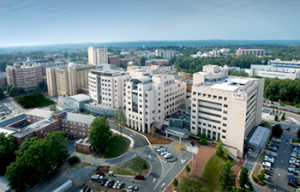Program Overview
During the 12-month fellowship, the structural heart disease fellow will gain procedural expertise to confidently, safely, and independently perform the following procedures:
- Transcatheter Aortic Valve Replacement (TAVR)
- Balloon-expandable valves
- Self-expanding valves
- MitraClip
- ASD, PFO and VSD closures
- Mitral and Aortic Balloon Valvuloplasty
- Percutaneous therapies for congenital heart disease
- Alcohol Septal Ablation
- Transeptal Left Heart Catheterization
- Perivalvular Leak Closure
- Left Atrial Appendage Closure
- CardioMEMSTM HF System
Clinical Responsibilities
UNC Heart Valve Clinic
The UNC Heart Valve Clinic is a busy multi-disciplinary full-day clinic on Wednesdays located within the UNC Medical Center and staffed by interventional cardiologists and cardiac surgeons. In this clinic, the fellow will evaluate new consults for structural and valvular heart disease interventions and see patients in follow-up after completion of their procedure.
Imaging Training
A central component to structural heart disease interventions is the ability to independently use advanced imaging techniques to plan for and conduct structural heart interventions. The ability to think in three dimensions from a 2-D picture is critical to the success of any structural heart disease interventionalist. Depending on prior experience and training, the fellow will spend sufficient time learning how to acquire, manipulate, and interpret multidetector computed tomography (MDCT) and 3-D TEE images. The fellow will be responsible for making all independent measurements for each procedure he/she is involved in.
Rounding
The fellow will be responsible for seeing patients in the hospital while they recover from their procedure. They will not serve as the primary team caring for the patient, but they will assist in consultation with post-operative care of the patient. In addition, the fellow will be responsible for seeing inpatient structural heart disease consults as they arise.
Operating Room/Cath Lab Experience
Depending on prior training as an interventional cardiologist or cardiac surgeon, the fellow will be encouraged to spend some time in the cardiac operating rooms or cardiac cath lab to complement their prior training experiences and gain an appreciation for the treatment options and limitations of cardiac surgery or interventional cardiology, respectively.
Training Courses
During the academic year, there will be sufficient time to attend the training and certification courses offered by the various makers of the devices used in structural heart. The goal is that all procedural requirements, training, and certification is obtained prior to the completion of the academic year.
Training Facilities & Locations
 UNC Medical Center; Chapel Hill, NC
UNC Medical Center; Chapel Hill, NC
The C.V. Richardson Cardiac Catheterization Laboratory at the University of North Carolina, Chapel Hill is a state of the art facility. The laboratory was completely renovated and fully refurbished in 2012 and again in 2016 with the latest Philips Allura Xper FD20 and FD10 systems. There are also several hybrid operating theaters on campus, including OR 22, VIR Room 9, and EP Lab F which will be used for hybrid endovascular procedures.
 UNC Rex Hospital; Raleigh, NC
UNC Rex Hospital; Raleigh, NC
The structural heart disease fellow may spend time at UNC Rex Hospital(UNC Health Care) in Raleigh, working with the North Carolina Heart & Vascular Groupto gain added experience in structural heart disease interventions such as TAVR and MitraClip.
Research Responsibilities
During the fellowship, the fellow will join our multidisciplinary structural heart disease research team. As a group, this team meets twice per month to discuss ongoing research activities. This research team includes medical students, residents, fellows, cardiology and cardiac surgery faculty, and faculty statisticians. In addition, the fellow will gain substantial experience in site-based research enrolling patients in structural heart disease clinical trials.
Call
There is no call during this year. However, for those wishing to continue to hone their percutaneous coronary interventional skills, there will be opportunities to join the STEMI call rotation and perform a limited number of complex coronary interventions as dictated by the workload demands and desire of the individual fellow.
Didactic Conferences
Interventional Cardiology Case Conference (Thursdays, 7 am)
A review of interesting cases with specific emphasis on interventional aspects and techniques.
Diagnostic & Hemodynamic Review (Wednesdays, 7 am)
A review of interesting diagnostic and hemodynamic cases from the previous week. The structural heart disease fellow will be asked to lead a handful of hemodynamic sessions for the general cardiology fellows throughout the year.
Quarterly Regional Interventional Case Conference
A regional conference organized by UNC with participation from all the major teaching institutions in the greater Triangle area and beyond, providing an opportunity for interventional fellows to present interesting cases at a regional level and learn from valuable discussion with other interventional cardiologists. This is a very popular and always educational event.
Innovations in Structural Heart
The University of North Carolina structural heart disease program strives to be an innovative and forward-thinking program that will help to shape the future of this profession. Our program performed the first ever suprasternal TAVR using the Aegis Suprasternal Transit system to deliver a Medtronic Evolut R valve. We were also the first program in North Carolina to perform a mitral valve-in-ring transcatheter mitral valve replacement. Our structural heart disease fellow will be an integral part of these innovative procedures and will join us as we publish and present our innovations at national and international meetings.